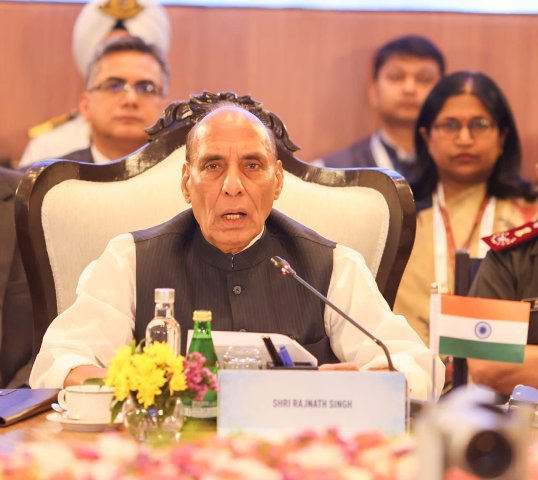India's Defence Minister, Shri Rajnath Singh, emphasized freedom of navigation, adherence to international law, and climate resilience while addressing the 11th ASEAN Defence Ministers’ Meeting-Plus (ADMM-Plus) forum in Vientiane, Lao PDR, on November 21, 2024. The forum included 10 ASEAN nations, eight Plus countries, and Timor-Leste, chaired by Lao Deputy Prime Minister and Defence Minister, General Chansamone Chanyalath.
Commitment to Freedom of Navigation and International Law
Highlighting India’s stance on the Indo-Pacific, Shri Rajnath Singh reiterated the nation's dedication to freedom of navigation, overflight, and unimpeded lawful commerce. He stressed the importance of adherence to international laws, particularly the United Nations Convention on the Law of the Sea (UNCLOS) 1982, to ensure regional peace and prosperity. Referring to the ongoing discussions on a Code of Conduct in the South China Sea, he advocated for a framework that respects the legitimate rights of all nations, including those not directly involved in deliberations.
Promoting Dialogue and Peaceful Resolution
Drawing on Buddhist principles of non-violence, Shri Rajnath Singh underlined the significance of dialogue in resolving international disputes amidst growing polarization. “India has always believed in dialogue as the cornerstone for addressing complex challenges,” he remarked, highlighting India's long-standing tradition of open communication, from trade agreements to border disputes. He emphasized that constructive engagement and mutual respect are vital for achieving long-term global stability.
Strengthening ASEAN Ties in the ‘Asian Century’
Describing the 21st century as the "Asian Century," Shri Rajnath Singh lauded ASEAN's dynamism in trade, commerce, and cultural exchange. He reaffirmed India’s deep-rooted connections with Southeast Asia, referencing Rabindranath Tagore’s reflections on India's cultural imprint in the region during his 1927 visit. He also celebrated a decade of India’s Act East policy, which has bolstered ties with ASEAN and Indo-Pacific nations, reiterating ASEAN's pivotal role in India's foreign policy.
Climate Change and Security
Addressing the urgent issue of climate change, Shri Rajnath Singh praised the ADMM-Plus forum for prioritizing climate resilience in its joint statement. He urged the development of an ADMM-Plus Defence Strategy on Climate Change, advocating for multi-stakeholder collaboration to protect vulnerable populations and safeguard defence infrastructure. Singh stressed the interconnection between climate risks and global security threats, calling for innovative solutions and stronger regional cooperation.
Safeguarding Global Commons
The Defence Minister highlighted the importance of preserving the Global Commons—natural resources and ecosystems that transcend national boundaries. He called for balanced, just stewardship of these resources, emphasizing their critical role in ecological and economic stability.
Enhanced Regional Engagement
The ADMM-Plus forum provides a crucial platform for ASEAN and its partners to discuss regional security challenges. Shri Rajnath Singh’s address reflected India’s commitment to collaboration, sustainable development, and shared prosperity in the Indo-Pacific.
The meeting culminated in a call for strengthened regional partnerships, with participants endorsing climate resilience, respect for international law, and collaborative approaches to address shared challenges.











